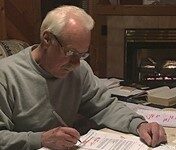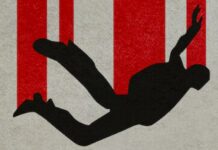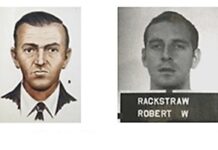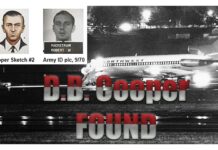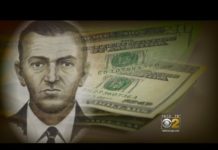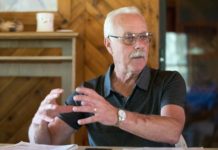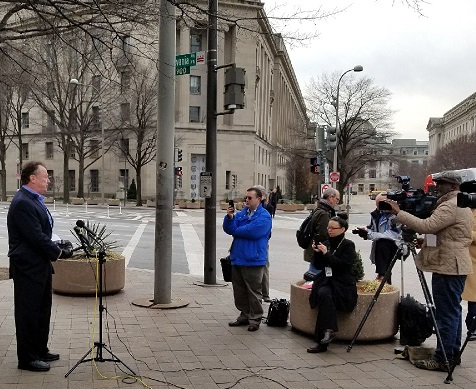
Seattle PI; by Daniel DeMay; February 1, 2018;
The organizer of a cold case team led by former FBI agents stated today that he has strong evidence the man they have long suspected of being D.B. Cooper was in fact quietly cleared, decades ago, because he was an award-winning black ops pilot for the CIA.
Documentarian Thomas J. Colbert made the stunning announcement outside FBI Headquarters after revealing that a former Army code-breaker on his 40-member team had found hidden messages in five taunting letters sent by a “Cooper” writer following the 1971 hijacking — messages, the team alleges, that point at their man.
What’s more, several people who know the suspect, a 74-year-old San Diego veteran named Robert W. Rackstraw Sr., have noted his apparent connections to the spy agency and its top-secret operations around the world, Colbert said in a news release.
“The new [letter] decryptions include a dare to agents, directives to apparent partners, and a startling claim that is followed by Rackstraw’s own initials: If captured, he expects a get-out-of-jail card from the CIA.”
The code-cracking follows earlier findings revealed by the team in the only typed letter, released recently through a court action by the hunt organizer.
In a brief phone call last year, Rackstraw only told the PI to verify Colbert’s claims; he did not issue a denial or comment further on Colbert’s investigation.
The case is the only unsolved case of air piracy in U.S. history. It began Nov. 24, 1971, when a man calling himself Dan Cooper bought a one-way ticket from Portland to Seattle on Northwest Orient Airlines. Aboard the Boeing 727, he handed a note to the flight attendant saying he had a bomb and that he wanted $200,000 and four parachutes, as well as a refueling truck when the plane reached Seattle.
Once there, he exchanged the passengers for the money and ordered the pilots to take off again with a flight plan for Mexico. Somewhere over southwest Washington state, the man lowered the rear stair door of the 727 and jumped out. He was never seen again.
The only verified evidence ever found was a small amount of $20 bills discovered along the Columbia River in 1980. They carried serial numbers that matched some of the money given to Cooper.
In 2016, the FBI announced it would stop actively investigating the case, but would take action on any physical evidence of the either the parachute or the cash.
Colbert’s acclaimed team, now at the end of its seven-year trail, produced evidence last August from a dig site within Cooper’s suspected jump area that they believe was part of his parachute. They handed the materials over to the FBI, along with the dig location itself and the identities of two alleged escape partners, still alive. But to date, Colbert said the FBI hasn’t responded about any of the evidence publicly, let alone visit the remote site or approach the elderly suspects.
Late last year, the investigators obtained through the courts a December 11, 1971, typed letter sent by a Cooper author that Colbert claimed supports allegations of a possible FBI cover-up.
The note also included random letters and numbers at the bottom. The organizer’s code-breaker, Rick Sherwood, was able to decode that encryption, and he found it pointed to the three Army units Rackstraw was connected to during his 1969-70 military service in Vietnam. The masked message was meant to serve as a signal to his veteran co-conspirators that he was alive and well after the jump, Colbert said.
Now Sherwood has cracked codes in the four earlier Cooper letters that not only support Rackstraw as a suspect, but also as a CIA operative, the team reported.
The letters “SWS” appear in one letter, short for “Special Warfare School,” where Rackstraw learned to code, Colbert said. Another unmasked note, in which Cooper claimed to be CIA openly, also had the letters “RWR” at the end. The team believes those are the initials of Robert W. Rackstraw.
According to court and police reports, eyewitness interviews and other evidence compiled by the cold case team, Rackstraw first conducted “off-the-books” ground missions for the CIA in Vietnam in 1969-70 and piloting work in Laos in 1972. Then he took on covert assignments through the 1970s and into the 1980s, allegedly linked to the Iran-Contra Affair.
Colbert said Pentagon records he obtained through Freedom of Information Act (FOIA) requests detailed skill sets Rackstraw received from Green Beret instructors in 1968, including 400 hours of Special Forces classes, HALO (High Altitude, Low Opening) commando-style parachuting, deception and psychological operations (PSYOPS).
One of Rackstraw’s former Vietnam commanders, LTC Ken Overturf (ret.), recalled him regularly hanging around at the First Cavalry’s officers club with a CIA man. Overturf said he witnessed the two leaving one day in a stolen Jeep, loaded with weapons and ammunition, according to Colbert’s latest release.
Rackstraw also repeatedly told people he was a Green Beret and had won numerous medals, according to a 1970 Santa Cruz Sentinel article that Colbert dug up. But military records show he never joined the Special Forces and several of the medals mentioned were found to be fake.
After Colbert’s first claim last November of an organized FBI cover-up, the agency didn’t respond to the accusation or make any statements about his case.
FYI: The FBI first learned of Rackstraw in the late 1970s during two fugitive runs from California authorities.
When special agents asked him at the end of the first escape in February 1978 if he was D.B. Cooper, the Stockton Record newspaper reported the suspect “demanded an attorney and the questioning on the subject was halted.”
Agents then fanned out into California, interviewing Rackstraw’s family members, friends, fellow veterans and co-workers. They even asked his new Oakland lawyer, Dennis Roberts, for the client’s palm print — one of about a dozen partial impressions found in Cooper’s jet seating area. According to two sources, Roberts’ answer to the agents’ request began with a laugh. “Are you crazy? I’d be pretty stupid to do that!”
After his second recapture a year later, the Record printed that Rackstraw said the FBI considered him “a James Bond who’d gone wrong.”
The very next day (2/3/79), the Seattle Times wrote that the California prisoner had been officially “ruled out” as D.B. Cooper and “dismissed from serious consideration” by the Bureau. Team members believe this was when the Seattle Division discreetly agreed to quash its Rackstraw hijacking investigation.
See more of the documented evidence of a cover-up in the 11/19/17 press release at the first entry entitled, “The Smoking Gun.”
— Thomas J. Colbert



